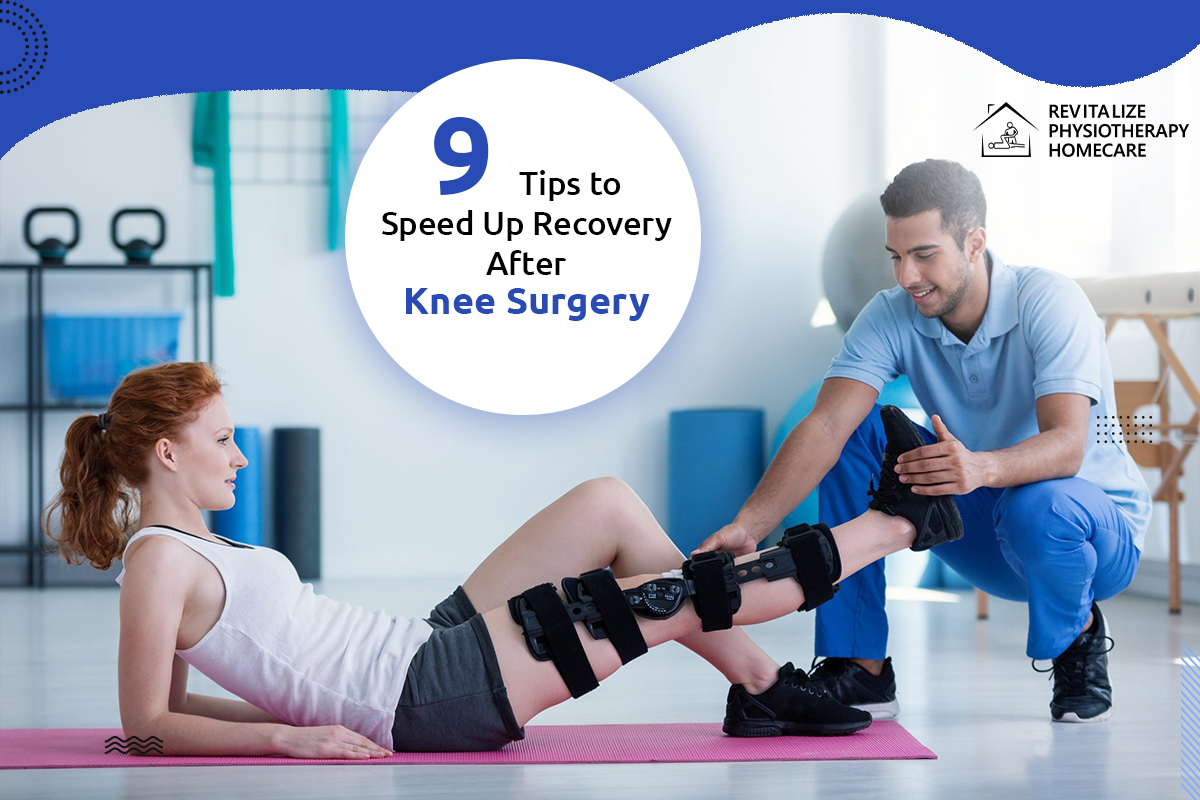9 Tips to Speed Up Recovery After Knee Surgery
Undergoing knee surgery can be a significant milestone on the journey to better mobility and pain relief. However, the real success of the procedure often depends on the recovery process.
Whether you’ve had your surgery at a Knee Replacement Clinic in Brampton or are planning knee replacement physio at home, a well-managed postoperative recovery is crucial. This blog aims to provide nine essential tips to help speed up your recovery after knee surgery.
These tips are designed to not only enhance the healing process but also to reduce the risk of complications. From the importance of following your physician's advice to the benefits of a healthy diet and regular physiotherapy, we'll cover everything you need to know for a swift and efficient recovery.
Let's dive into these valuable insights to help you get back on your feet faster and stronger.
Important Tips to Speed Up Recovery Post-Knee Replacement
1. Follow All Recommendations from Your Physician
Adhering to your physician’s advice is paramount. They know exactly what your knee needs to heal. This includes taking prescribed medications, attending follow-up appointments, and respecting any movement restrictions. Ignoring these instructions can slow down your recovery or cause complications. Remember, each guideline from your doctor, whether it’s from a Knee Pain Treatment Brampton specialist or elsewhere, is tailored to your specific surgical outcome and overall health, making it a critical component of your recovery journey.
2. Keep the Incision Site Clean
Keeping the surgical area clean is essential to prevent infection. Follow your doctor's instructions on how to care for the wound. This might include cleaning it with a specific solution, changing dressings regularly, and being alert for signs of infection like redness, swelling, or unusual discharge. A clean incision site heals faster and better, reducing the risk of complications that could hinder your recovery process.
3. Watch Your Step to Prevent Fall
Being cautious to prevent falls is crucial. A fall can damage your new knee and set back your recovery. Use handrails on stairs, avoid slippery surfaces, and clear your home of tripping hazards. If you’re using a walker or cane, make sure it's adjusted to the right height and you’re comfortable using it. Being vigilant about your surroundings and how you move can significantly reduce the risk of falls and injuries.
4. Avoid Putting Pressure or Kneeling on Your Knee
It’s important to avoid putting direct pressure on your new knee. Kneeling or putting too much weight on it can hinder healing. Follow your doctor’s advice about weight-bearing limits and use aids like crutches or a walker as recommended. This caution helps ensure that your knee heals properly and the implant settles correctly, which is crucial for the long-term success of the surgery.
5. Walk Frequently Once You’re Allowed
Regular walking, as soon as your doctor approves it, can aid in your recovery. Walking helps to improve blood circulation, reduce the risk of blood clots, and strengthen your muscles. Start with short, gentle walks and gradually increase the distance as you feel more comfortable. Walking is a low-impact activity that plays a significant role in regaining mobility and strength in your knee.
6. Use Supportive Equipment Given to You
Utilize all the equipment provided to you, such as walkers, canes, or knee braces. These aids are designed to support your knee and ensure safe movement. Using them correctly can prevent strain on your new knee and aid in proper healing. Don’t hesitate to ask for a demonstration or clarification on how to use these aids effectively to make the most out of them for your recovery.
7. Eat Healthy and Balanced Food
A nutritious diet plays a vital role in healing. Eat a well-balanced diet high in proteins, vitamins, and minerals. These nutrients aid in tissue repair and strengthen your immune system. Avoid processed foods and excessive sugar, which can lead to inflammation and slow down the healing process. Also, be sure to stay hydrated by drinking lots of water. A healthy diet not only supports your recovery but also contributes to your overall well-being.
8. Get Plenty of Sleep & Rest
Your body restores and rejuvenates itself when sleeping. Hence, be sure to keep a regular sleep schedule and obtain adequate rest. If you’re experiencing discomfort that prevents you from sleeping well, talk to your doctor about solutions. Quality sleep can significantly enhance the healing process and is a crucial element of post-surgery recovery.
9. Do Physiotherapy and Occupational Therapy Exercises
Engaging in physiotherapy and occupational therapy exercises is vital. These exercises are designed to restore mobility, strength, and flexibility to your knee. Follow your therapist’s instructions and commit to your exercise regimen. Consistent physiotherapy, whether it’s knee replacement physio at home or at a clinic, can dramatically improve your recovery speed and the overall outcome of your surgery.
Conclusion
In summary, recovering from knee surgery is a journey that requires commitment and careful attention to various aspects of your health and lifestyle. From following medical advice and maintaining a clean incision site to engaging in regular physiotherapy, each of these nine tips contributes to a faster and more successful recovery.
Whether it's seeking Knee Pain Treatment Brampton or undergoing knee replacement surgery, these guidelines can help you navigate your postoperative period effectively. Remember, your dedication to these recovery strategies can influence the outcome of your surgery.
Hence, it's necessary to choose the right knee replacement physiocare center like Revitalize. We have a team of seasoned physiotherapists killed in knee replacement treatment. To book an appointment with us contact 905-452-0222. Or you can also send us an email at revitalizephysio@gmail.com.




